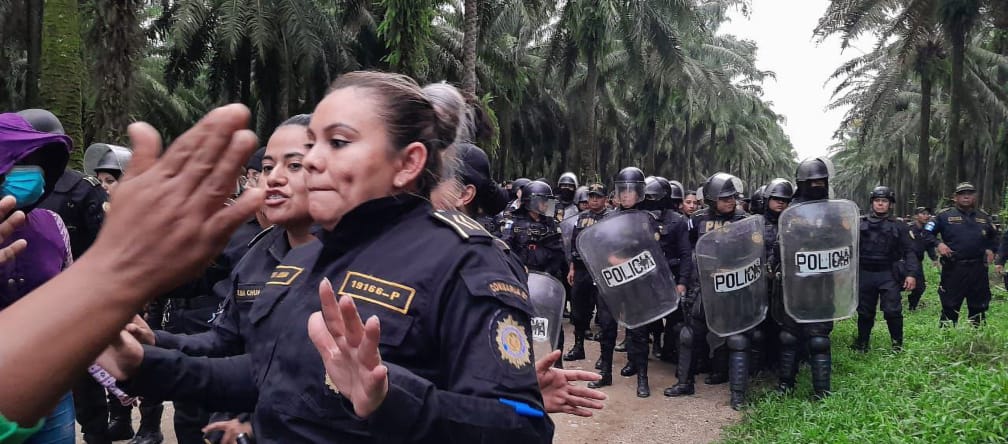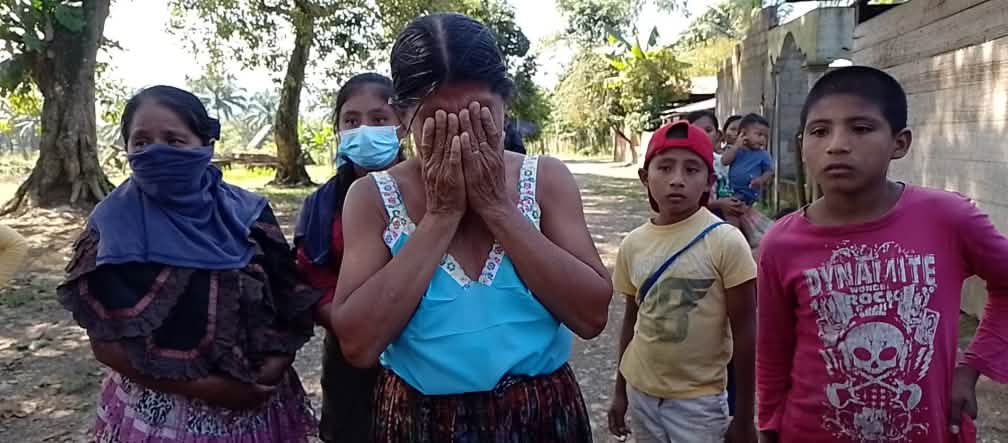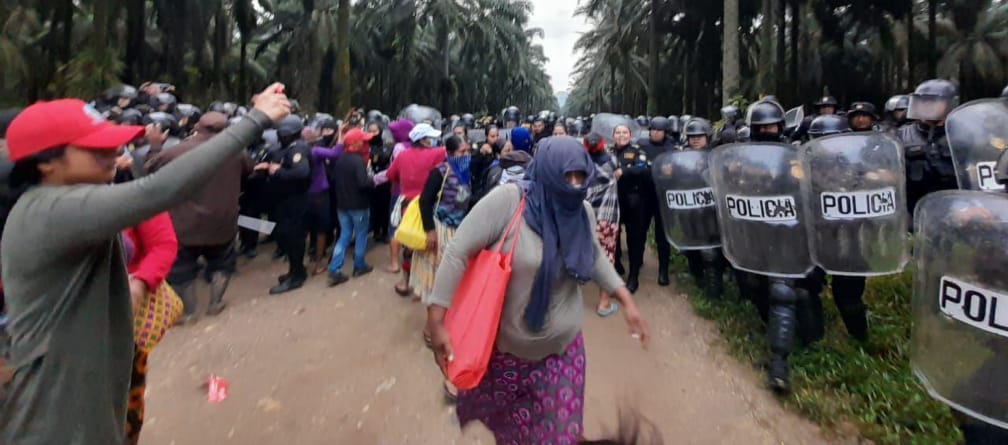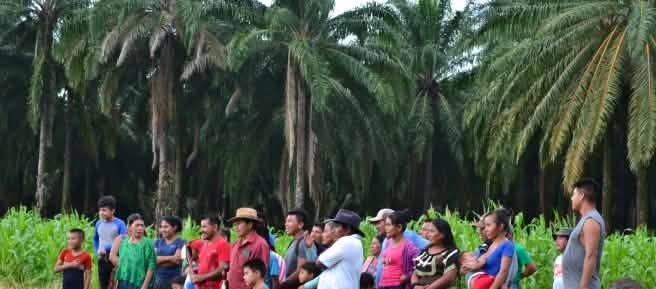Guatemala: Stop the palm oil industry’s violence against the Maya!
The Maya people are being brutalized by riot police in Guatemala. Local people say that the police raids in the rainforest around Lake Izabal are linked to their protests against land grabbing and pollution by the palm oil company NaturAceites and a nickel mine and smelter owned by the Swiss Solway Investment Group.
News and updatesTo: the President of Guatemala, Mr. Alejandro Giammattei; MPs; the public prosecutor; the magistrate’s court; the multinationals Nestlé and Unilever
“Respect the rights and security of the Mayan Q’eqchi Indigenous people: Stop the raids, evictions and all forms of violence.”For months, massive units of riot police have repeatedly descended on the oil palm plantations around Lake Izabal in northeastern Guatemala. Their mission: to evict the Indigenous Maya communities.
Local people report being subjected to clouds of tear gas. Women have been assaulted, their belongings stolen, and people – including minors – arbitrarily arrested. In December, one person was shot and at least two people otherwise injured.
Outraged and grief-stricken women in the Maya community explain: “They threw tear gas grenades to drive us out of our homes.”
Others report: “They attack us as if we were terrorists. But we are not – we are just poor Indigenous people who do not even have enough corn, beans or chili to eat."
The driving force behind the operations is NaturAceites, a palm oil company that reportedly sells its oil within Guatemala and to multinationals like Nestlé and Unilever via international supply chains. The spread of oil palm plantations is a violation of Maya land rights. Sewage from the oil mills is polluting the lake and ruining local livelihoods. NaturAceites denies all allegations.
The nickel mine and smelter of the Swiss Solway Investment Group is also mentioned repeatedly in connection with the land and environmental conflicts around Lake Izabal.
Arrest warrants have been issued for about 20 community members, including leaders of the Maya Council, and rewards have been offered for their capture.
The Maya Council is demanding an end to the aggression and the clarification of land and environmental rights by the Guatemalan government and the relevant authorities. They have also called on corporate palm oil buyers such as Nestlé and Unilever to take a stand on the issue.
The Lake Izabal region has been the scene of serious conflicts over land rights and the treatment of the environment and nature. The Maya Indigenous communities are calling on the state to recognize their ancestral land rights, which are being increasingly compromised by the spread of agribusinesses, as well as the nickel mining and smelting industry and the pollution they cause.1
NaturAceites
The palm oil company NaturAceites has been expanding its land areas for years. According to its own figures, it currently produces palm oil on around 12,000 hectares of its own plantations, and on another 19,000 hectares of third-party plantations.2 The monocultures in the southwest of Lake Izabal extend down to the shore and surround villages such as El Chapin.
Local people complain that wastewater from the NaturAceites palm oil mill is polluting the fragile ecosystem of the lake, leading to fish kills and plagues of insects.3 NaturAceites denies all allegations.
Solway Investment Group
On the northwest shore of the lake, the Swiss Solway Investment Group operates the Fenix Project,4 the largest nickel mine and smelter in Central America.5. The wastewater from these operations also contaminates the lake, and local people blame the mine and smelter for massive particulate air pollution.
Many people are said to have fallen ill as a result, while wildlife in Lake Izabal – including manatees, turtles and fish – is dying. The Solway Investment Group also denies all allegations.
Reporting in the local media
The regional press Avispa Midia reports on the violent raid and eviction:6 "NaturAceites, the palm oil producer that distributes Capullo oil, stands accused in nine cases filed by the Guatemalan Ministry of Environment and Natural Resources. The company is said to be causing the death of hundreds of fish with the waste from its monocultures. In addition, the company has allegedly started projects without a prior environmental impact assessment.
NaturAceites operates oil palm plantations and oil mills in the departments of Izabal, Alta Verapaz, Petén and Escuintla, and sells its palm oil products in Mexico, the United States and the Dominican Republic. The company also supplies multinational companies such as Nestlé and Unilever.
Prensa Comunitaria quotes the president of the Comité Campesino del Altiplano (CCDA), Úrsula Teyul: “Not only in the municipality of Chapín Abajo, but also in the whole series of evictions in the Q’eqchi’ region of Alta and Baja Verapaz, Petén and Izabal, the rights of all brothers and sisters who find themselves in this situation are violated. We call on the international community to take a stand and assert the rights of Indigenous peoples.
Prensa Comunitaria reports that already in 2021, more than 90 families were evicted from the nearby community of Chinebal and made homeless.7
“A state of siege was imposed in El Estor in late 2021 after authorities violently suppressed protests by Maya Q'eqchi communities to prevent the passage of vehicles carrying coal from the Fénix mining company, even though its operations had been declared unconstitutional,” writes Avisa Midia.
1 Consejo del Pueblo Maya 2022. Pronunciamiento de comunidades Maya Q’eqchi’: https://www.facebook.com/watch/?v=825573451888742
2 NaturAceites 2022. Reporte de Sostenibilidad 2021, Seite 133: https://naturaceites.com/wp-content/uploads/2022/12/Reporte-de-sostenibilidad-Digital.pdf
3 Mongabay 2022. Naturaceites: la industria palmicultora denunciada por mortandad de peces, plagas de moscas y proyectos sin estudios ambientales en Guatemala: https://es.mongabay.com/2022/10/naturaceites-industria-de-palma-denunciada-por-mortandad-de-peces-y-proyectos-sin-estudios-ambientales-guatemala/
4 Solway Investment Gruppe (2022). FENIX PROJECT, GUATEMALA: https://solwaygroup.com/our-business/fenix-project-guatemala/
5 Tagesschau.de 2022. Schmutziger Nickelabbau. Datenleak offenbart Bergbau-Geheimnisse: https://www.tagesschau.de/investigativ/schmutziger-nickelabbau-guatemala-101.html
6 Avispa Midia 2022. Guatemala: Mayas en resistencia contra palma africana son atacados por fuerza policial: https://avispa.org/guatemala-mayas-en-resistencia-contra-palma-africana-son-atacados-por-fuerza-policial/
7 Prensa Comunitaria 2021. Horror y fuego en Chinebal, el desalojo que favoreció a los palmeros en El Estor:https://prensacomunitaria.org/2021/11/horror-y-fuego-en-chinebal-el-desalojo-que-favorecio-a-los-palmeros-en-el-estor/
To: the President of Guatemala, Mr. Alejandro Giammattei; MPs; the public prosecutor; the magistrate’s court; the multinationals Nestlé and Unilever
Mr. President, Ladies and Gentlemen,
Reporting and images of the violent crackdowns by police units in the community of Chapín Abajo, in El Estor, Izabal, are truly scandalous. The human rights situation in Guatemala urgently needs to be reviewed and respected.
Social, peasant and territorial organizations have spoken out against the abuse of authority committed by the police, including in the joint action of the public prosecutor's office (MP) and the national civil police (PNC) on December 6, 2022.
In solidarity with Maya Q’eqchi communities, we call on you to:
- stop the police attacks and violence
- respect the rights of the Maya Q’eqchi Indigenous people and ensure their security
- initiate an investigation into the actions of the police officers involved in the violent action against the families in Chapín Abajo
- end the harassment, criminalization, intimidation and persecution and cancel the arrest warrants against members of the Maya community.
- cancel the eviction orders of communities such as Chapín Abajo, Santa Rosita, Buena Vista and others
- issue a full statement of the intent of these police actions, which undermine the integrity, dignity and rights of Indigenous communities
- ensure the legal recognition of Maya ancestral land rights with communal land titles
- promote development, health, education, inclusion and respect for Maya communities
- protect the environment and natural resources
We look forward to hearing from you and receiving your response to this letter very soon.
The companies Unilever and Nestlé will be informed about this letter and also asked to comment.
Yours faithfully,
The issue – rainforest on our dinner tables and in our fuel tanks
At 66 million tons annually, palm oil is the most commonly produced vegetable oil. Its low world market price and properties that lend themselves to processed foods have led the food industry to use it in half of all supermarket products. Palm oil can be found in frozen pizzas, biscuits and margarine, as well as body creams, soaps, makeup, candles and detergents.
Few people realize that almost half of the palm oil imported into the EU is used as biofuel. Since 2009, the mandatory blending of biofuels into motor vehicle fuels has been a major cause of deforestation.
Oil palm plantations currently cover more than 27 million hectares of the Earth’s surface. Forests and human settlements have been destroyed and replaced by “green deserts” containing virtually no biodiversity on an area the size of New Zealand.
The impact – suffering and death in producer countries, climate havoc
The warm, humid climate of the tropics offers perfect growth conditions for oil palms. Day after day, huge tracts of rainforest in Southeast Asia, Latin America and Africa are being bulldozed or torched to make room for more plantations, releasing vast amounts of carbon into the atmosphere. As a consequence, Indonesia – the world’s largest producer of palm oil – temporarily surpassed the United States in terms of greenhouse gas emissions in 2015. With their CO2 and methane emissions, palm oil-based biofuels actually have three times the climate impact of traditional fossil fuels.
Palm oil is not only bad for the climate: As their forest habitat is cleared, endangered species such as the orangutan, Borneo elephant and Sumatran tiger are being pushed closer to extinction. Smallholders and indigenous people who have inhabited and protected the forest for generations are often brutally driven from their land. In Indonesia, more than 700 land conflicts are related to the palm oil industry. Human rights violations are everyday occurrences, even on supposedly “sustainable” and “organic” plantations.
As consumers, we are largely unaware of these broader issues, yet our daily palm oil consumption also impacts our health: refined palm oil contains large amounts of harmful fatty acid esters that are known to damage DNA and cause cancer.
The solution – a revolution on our dinner tables and in our fuel tanks
Only 70,000 orangutans still roam the forests of Southeast Asia, yet the EU’s biofuels policy is pushing them to the brink of extinction. Every new plantation on Borneo is destroying a further piece of their habitat. Stepping up the pressure on policymakers is a must if we want to save our tree-dwelling kin. Apart from that, however, there is still a lot we can do in day-to-day life.
Follow these simple tips to recognize, avoid and combat palm oil:
- Enjoy a home-cooked meal: Use your imagination: why not try almond-coconut-pear biscuits? Or pizza with potato and rosemary? A meal cooked from fresh ingredients beats processed foods containing palm oil every time. Oils such as sunflower, olive, rapeseed or flaxseed are ideal for cooking and baking.
- Read labels: As of December 2014, labeling regulations in the EU require food products to clearly indicate that they contain palm oil. However, in the case of non-food items such as cosmetics and cleaning products, a wide range of chemical names may still be used to hide the use of palm oil. A quick check of your favorite search engine will turn up palm oil-free alternatives, however.
- Remember that the customer is king: Ask your retailers for palm oil-free products. Write product manufacturers and ask them why they aren’t using domestic oils. Companies can be quite sensitive to issues that give their products a bad name, so inquiring with sales staff and contacting manufacturers can make a real difference. Public pressure and increased awareness of the problem have already prompted some producers to stop using palm oil.
- Sign petitions and write your elected representatives: Online campaigns put pressure on policymakers responsible for biofuels and palm oil imports. Have you already signed all of Rainforest Rescue’s petitions?
- Speak out: Protest marches and creative action on the street raise public and media awareness of the issue, which in turn steps up the pressure on policymakers.
- Leave your car at home: Whenever you can, walk, ride a bicycle or use public transport.
- Be informed and inform others: Big Business and governments would like us to believe that biofuels are good for the climate and that oil palm plantations are sustainable. Spread the word – share this information with your family and friends and encourage them to rethink their consumption habits. It’s in our hands!
Nestlé 2021. Supply Chain Disclosure Palm Oil: https://www.nestle.com/sites/default/files/2019-08/supply-chain-disclosure-palm-oil.pdf
Unilever 2022. 2021 Palm Oil Mills, page 5: https://www.unilever.com/files/8924ecaf-b04a-4777-a0c5-5e62e718d998/unilever-palm-oil-mills-list-2021.pdf
Mongabay 2022. Naturaceites: la industria palmicultora denunciada por mortandad de peces, plagas de moscas y proyectos sin estudios ambientales en Guatemala: https://es.mongabay.com/2022/10/naturaceites-industria-de-palma-denunciada-por-mortandad-de-peces-y-proyectos-sin-estudios-ambientales-guatemala/
Tagesschau.de 2022. Schmutziger Nickelabbau. Datenleak offenbart Bergbau-Geheimnisse: https://www.tagesschau.de/investigativ/schmutziger-nickelabbau-guatemala-101.html



